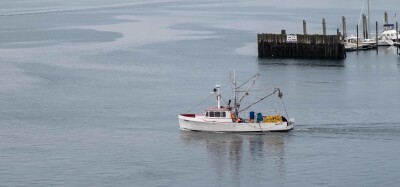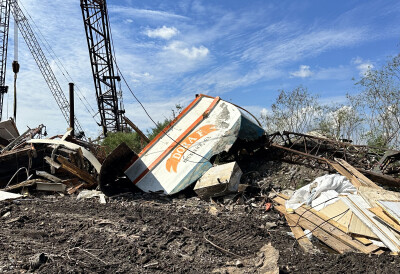Responders worked through the weekend in an effort to contain a diesel spill near Bella Bella, British Columbia, the result of a Kirby Offshore Marine tug and barge running hard aground at the entrance to the Seaforth Channel early Thursday morning.
Sheen is visible on the water on Oct. 18 near the site of the grounding. Canadian Coast Guard photo.
The spill threatens an important traditional fishery managed by the local Heiltsuk First Nation, which has said that dozens of sensitive species are at risk, including manila clams. The manila clam fishery had been due to open in about three weeks, Heiltsuk officials said, and provides approximately $150,000 in annual income to the Nation. On Friday, Fisheries and Oceans Canada closed the fisheries in the area.
"That’s what we’re literally anguishing over right now," Heiltsuk Chief Councillor Marilyn Slett told Canada’s National Observer, an environmentally focused publication. "What are we going to do? These are people who depended on the harvest for their winter economy. We expect we’ll sit down with some other government agencies to start having these (legal and financial) discussions."
Heiltsuk representatives are seeking frozen clams harvested in Gale Passage and or Seaforth Channel area prior to the spill to use as baseline tissue samples for future toxicology testing.
By Tuesday afternoon, the barge DBL 55 had been removed from the scene and was being towed to Vancouver, according to the Canadian Coast Guard, which is working with Kirby, the Western Canada Marine Response Corporation, officials from the Heiltsuk First Nation, and other government agencies to respond to the spill. The barge had been empty of cargo at the time of the grounding, but some fuel from the attached tug Nathan E. Stewart was later pumped into one of its tanks. The ATB tug Nathan E. Stewart, source of the spilled diesel, remained partially submerged at the site of the grounding Tuesday, but was resting on the bottom and considered stable with all vents plugged, the Coast Guard said.
Houston-based Kirby said the tug had been loaded with 59,924 gals. of diesel fuel when it ran aground, and that 6,554 gals. of diesel had been pumped from the tug into a tank on the barge before the pumps failed due to water in the engine room. Kirby confirmed that the tug was also carrying 639 gals lube oil, 550 gals hydraulic oil, 550 gals gear oil, 969 gals dirty bilge water. The amount of fuel spilled had not been confirmed as of Tuesday evening.
Responders began hot tapping operations Monday evening, and lightering operations to remove the remaining fuel from the tug were expected to take approximately 40 hours to complete. Crews planned to work around-the-clock until all remaining fuel was removed, but a storm was expected to develop Tuesday night into Wednesday that might hamper response efforts. As of 3 p.m. Tuesday, the Coast Guard reported that 23,348 gals. of fuel had been removed from the tug overnight. The Coast Guard said salvage plans were still being developed, but initially called for a crane to be brought in to lift the tug onto a barge for removal.
Observations on Monday showed some amount of diesel surfacing from the tug, and some observed to have escaped containment booming during the high tide. Two overflights of the site on Monday showed a light sheen within the containment boom and outside of it. Sheen was also observed on the south side of Seaforth Channel and around the mouth of Gale Channel.
Heiltsuk feeling the pain & loss of enviro disaster, still a lot of diesel seen during air tour 2day. Long road ahead us #NathanEStewart pic.twitter.com/HhedJrCthX
— Marilyn Slett (@bellabellabc) October 18, 2016
On Monday, BC Minister of Transport Marc Garneau issued a statement praising the Heiltsuk for their initial response efforts and listing the "safety and protection of the public and the environment" as the government's first priority. Garneau also hinted at possible changes to come to marine safety policies.
"Improving marine safety is a key part of my mandate as Minister of Transport and I take this situation very seriously," Garneau said. "The Nathan E. Stewart incident underlines the need for changes in the way we respond to marine pollution incidents, and that is why I am currently working on a coastal strategy to improve marine safety in a meaningful way."
A version of this article was first published by our sister publication, WorkBoat.







